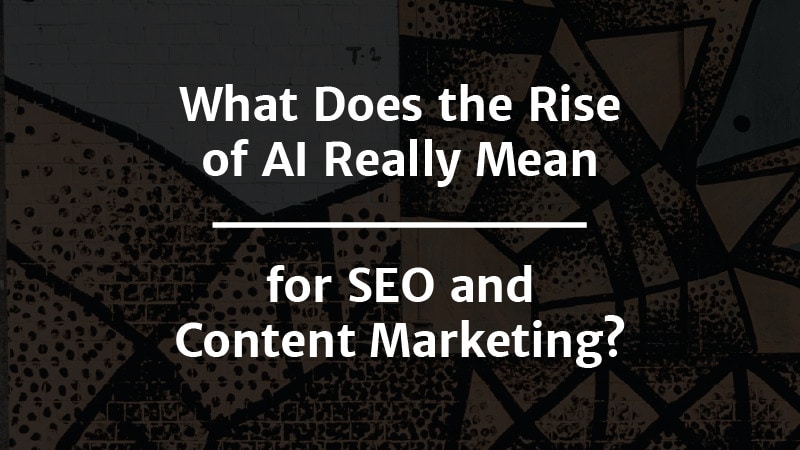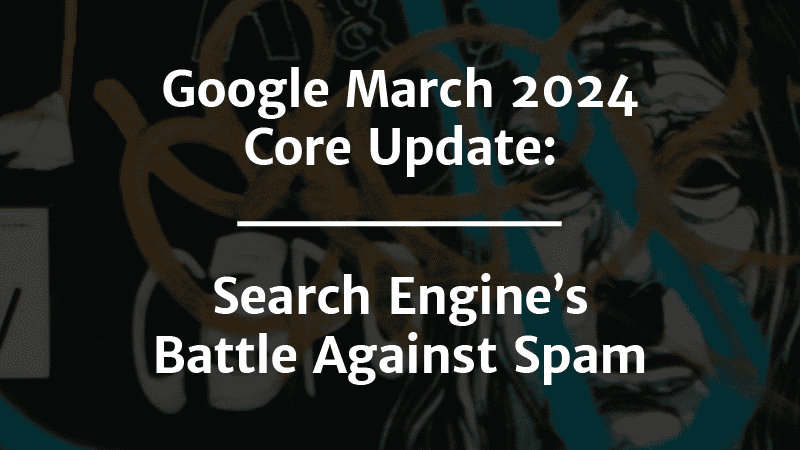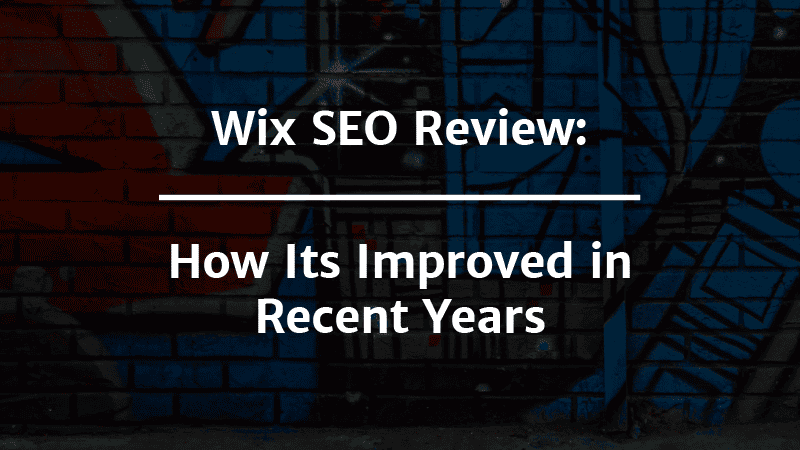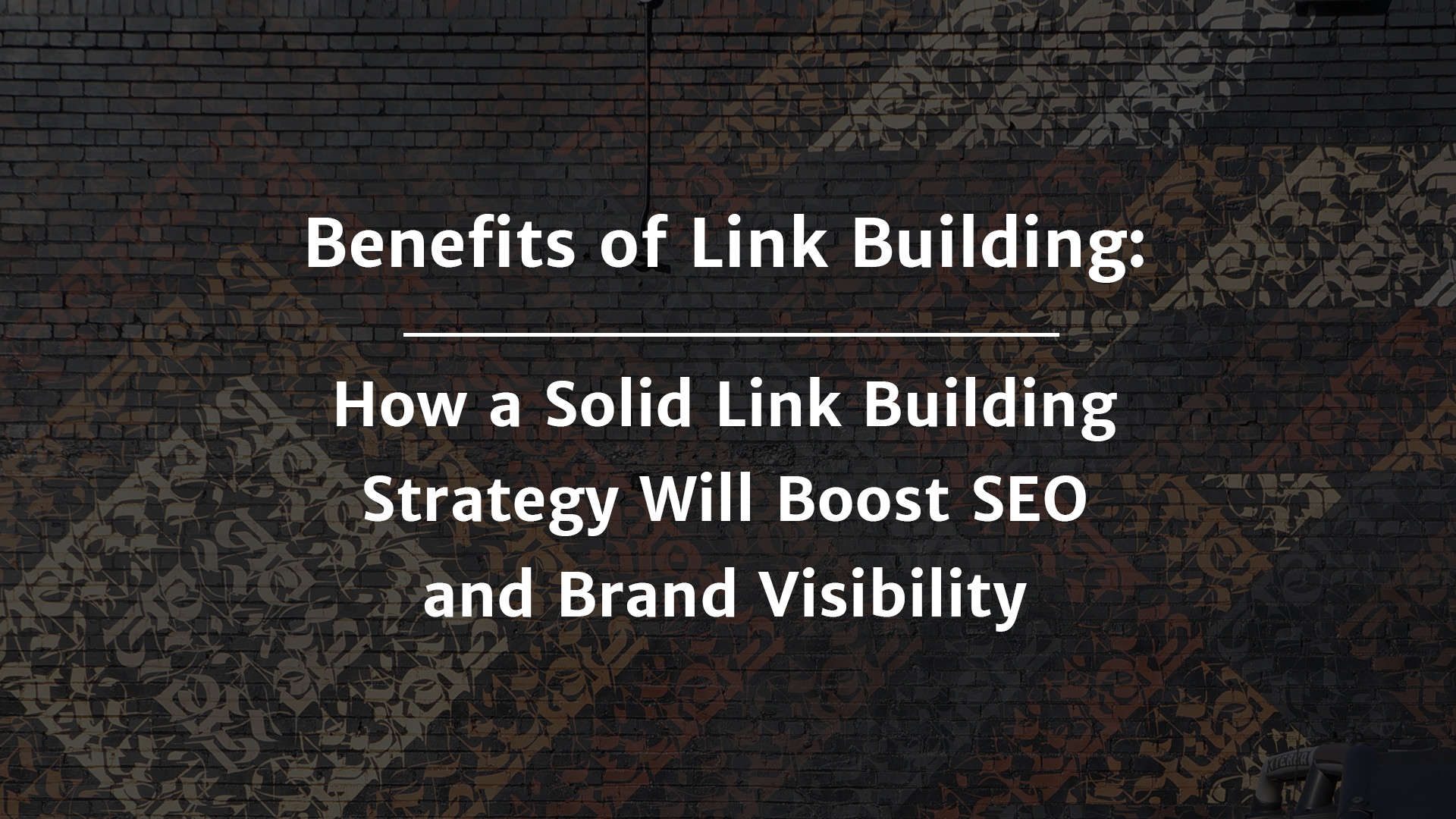Artificial intelligence (AI) isn’t a figment of our imaginations anymore. It has officially graduated from Judy Jetson’s robot housekeeper to tools like ChatGPT and Perplexity AI, accessed on desktop browsers or mobile apps.
With features like machine learning and natural language processing (NLP), AI is here and has become a regularly used tool, even at work. As of 2023, 50% of companies are using AI, with 27% reporting regular use. For instance, healthcare providers use AI to help detect illness, while retailers leverage it to create more frictionless checkout experiences.
For marketers relying on strategies like content and search engine optimization (SEO), AI brings a reckoning that’s forcing the industry to consider what constitutes original work, the necessity of human writers, the future of SEO, and how to best move forward with AI tools.
Here’s a look at how AI will affect SEO content creation in the near future, plus some of the most effective ways marketers can use AI tools to improve search rankings and increase organic traffic without sacrificing content quality and consumer trust.
How Will AI Affect SEO?
AI tools can support SEO strategy by reducing manual tasks, increasing automation and efficiency, and making it easier to access and analyze bigger datasets to provide insights on ranking factors. Insights and predictions from AI tools can improve SEO strategies and help deliver higher rankings.
Despite fears of machines rendering human marketers and content creators obsolete, AI tools are not coming for your job. That said, AI tools, like any other significant technology advancement, have the power to drastically disrupt the SEO industry by changing how we do things.

So, as SEO professionals and content marketers, we should ask, “What do I need to learn about AI tools to become better at my job?”
By understanding the impact of AI and reskilling to learn how to use it effectively, marketers can take advantage of the opportunity presented by AI tools.
"So, as SEO professionals and content marketers, we should ask, “What do I need to learn about AI tools to become better at my job?” By understanding the impact of AI and reskilling to learn how to use it effectively, marketers can take advantage of the opportunity presented by AI tools."
While the explosive growth of ChatGPT makes AI seem like a recent update, Google Search has been powered by AI tools since the introduction of RankBrain in 2015. And there is far more than just chatbots to AI. Here are two ways AI has already impacted the way SEO works.
The Use of AI in Search Engine Algorithms
Search engines, like Google, use AI technology to help determine the rankings of search engine results pages (SERPs). In order to serve the most relevant results, Google uses features like NLP to understand user queries and the search intent behind the text.
After introducing NLP technology, Google’s search engine became better at understanding the intent of conversational search keywords.
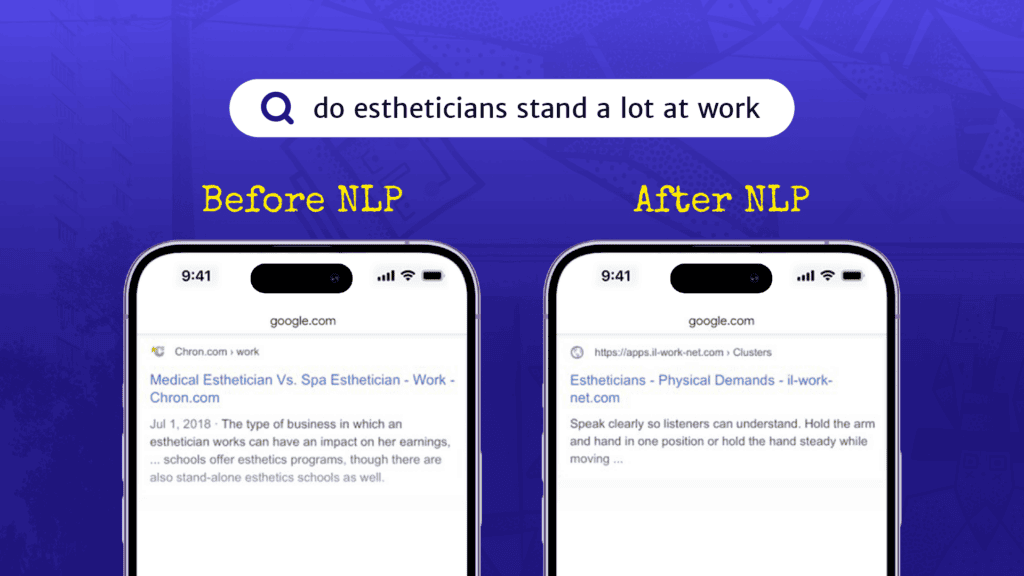
As a result, search engines can better identify relevant and high-quality content, meaning marketers must create engaging and helpful content for readers instead of stuffing keywords for an algorithm.
How AI Will Guide the Future of SEO
Advances in natural language processing, new research tools, the popularity of conversational AI chatbots, and the increased usage of voice search among users will change the type of content that’s most relevant based on user behavior.
In other words, people are now able to interact with technology in many of the same ways they interact with other humans.
"In other words, people are now able to interact with technology in many of the same ways they interact with other humans."
In particular, searchers can be more specific and nuanced in their queries, and Google will better understand their intent. For marketers wanting to know more about how AI will affect SEO, this means successful strategies will likely prioritize long-tail keywords and more conversational content.
In short, the rising popularity of AI tools and features is turning SEO into a much more people-centric channel. Marketers can focus more heavily on creating a great experience for their human audience instead of trying to balance natural language with awkward keyword placement meant for search algorithms.
Furthermore, with AI helping Google to understand context and conversational language, high-ranking SEO content can be nuanced and more helpful instead of competing for generic larger-subject keywords.
AI Content Creation Missteps
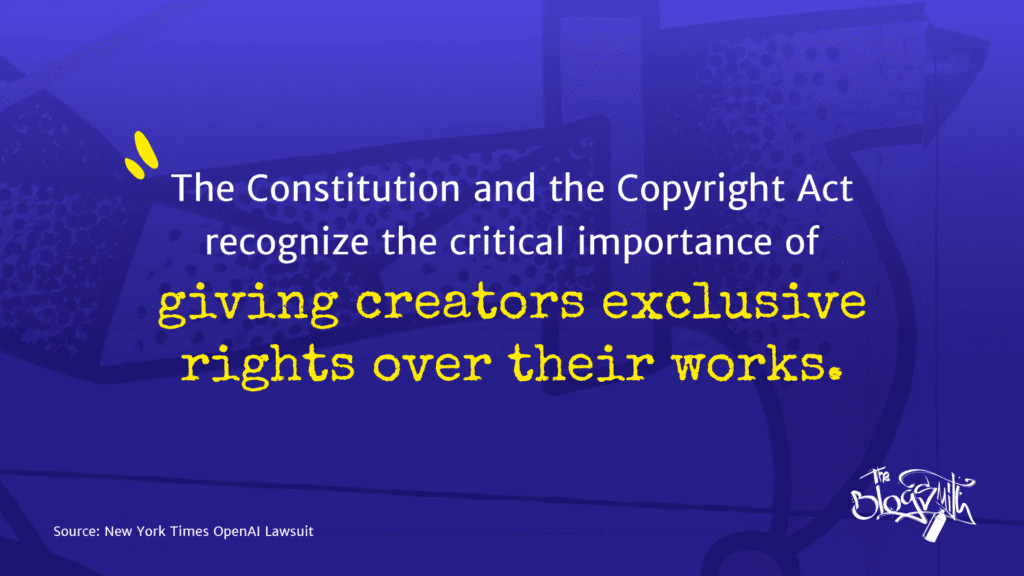
AI tools rely heavily on training datasets to learn to generate output. As such, it’s crucial to understand that AI models and their output are only as good as the data used to train them. For tools that use natural language processing, training data is often composed of human writing examples scraped from the internet.
OpenAI’s ChatGPT, for one, was trained on “vast amounts of data written by humans on the internet.” That use of copyrighted material without permission has led content creators to ask, “Can AI developers use my original creations in a training set without my permission?” For many, the answer is “No.”
Lawsuits from comedian Sarah Silverman and the New York Times are examples of early pushback, as both are suing companies like OpenAI over the use of their work to train generative AI tools without permission.
In August of 2023, a U.S. court decided that AI-generated art could not be copyrighted, further solidifying the idea that works of art must have human authors to be eligible for copyright protection. Still, it did not address whether AI training violated existing copyrights.
In spite of the legal, ethical, and quality concerns in AI content creation, the adoption of AI tools for business use doesn’t seem to be slowing down. According to a study by KPMG, 83% of business leaders plan to increase their investment in AI by 50% or more in the next 6-12 months.
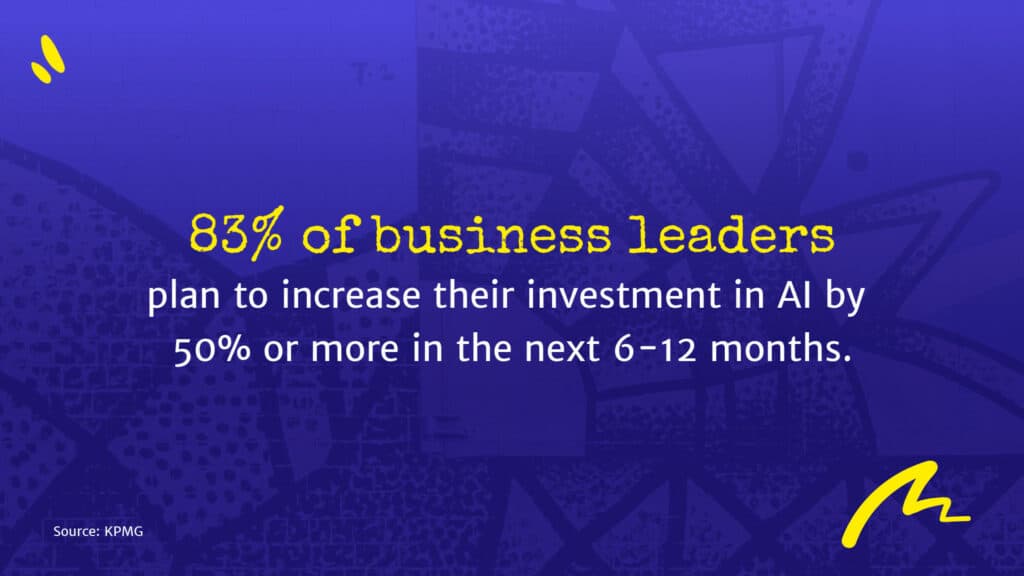
As more companies invest in AI, we must understand how to use AI effectively and responsibly.
How To Thoughtfully Use AI To Improve SEO
At the end of the day, AI is here to stay, and refusing to use it is like insisting that you still prefer VHS tapes. Understanding how AI works and where it can best help your content marketing strategy will be key to future success.
Here are some tips you can follow to thoughtfully use AI tools at each stage of the SEO content creation process to increase efficiency and improve results while maintaining high content quality standards.
Keyword Research
AI tools are especially useful for helping you find relevant keywords and search queries. That said, they should still be used along with traditional keyword research tools, like Ahrefs and Semrush, that include information like search volume and keyword difficulty.
While tools like ChatGPT and Google Bard (Now Gemini) can help you brainstorm keywords, understand user intent, and suggest article topics, it’s still crucial to have human oversight and judgment. At the end of the day, it’s people who know your brand and your audience best.
Content Research
One of the best ways to use AI tools to streamline the writing process is by supporting content research, but it has to be done thoughtfully. Accuracy and bias remain top concerns with AI output, with 63% of marketers listing it as a top challenge.
While specialized AI research tools continue to be developed and released, many creators continue to rely on generalist AI chat tools where accuracy and bias issues are especially prominent.
The trouble with AI chat tools is that the models state predictions and assumptions based on the information they were trained on as absolute facts. And AI tools like ChatGPT and Gemini don’t cite sources to back up claims or give users a way to fact-check results quickly.
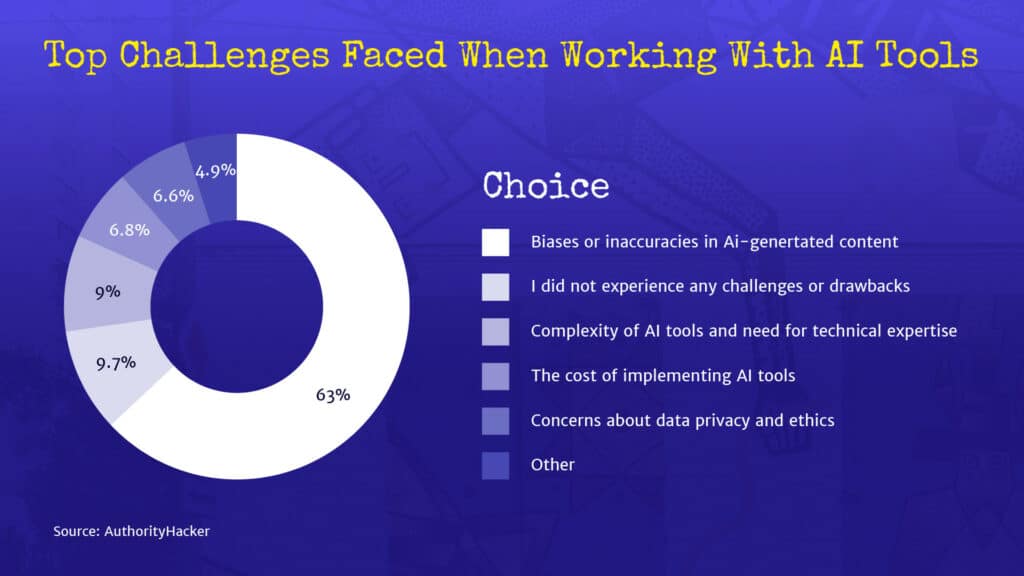
Research-specific tools like Google Scholar work to combat erroneous information by limiting source material to peer-reviewed, academic, and legal sources that only publish vetted information. Other research tools like Scite use chat AI tools but add cited resources and context to make fact-checking easier.
As content marketers, it’s our job to deliver relevant, high-quality information to our audience, so we should be rigorous about fact-checking and finding reliable sources to back up claims made by an AI.
"As content marketers, it’s our job to deliver relevant, high-quality information to our audience, so we should be rigorous about fact-checking and finding reliable sources to back up claims made by an AI."
Generating Outlines
While we don’t recommend using AI tools to generate entire content pieces, they can be useful for organizing your thoughts and generating content briefs or outlines.
For example, you can record yourself speaking about a topic, have an AI create a transcript, and then ask the AI to organize that transcript into an outline. This way, the ideas remain original, but you can still use AI to expedite the process of putting together the content structure.
For the best outlines, it’s helpful to use AI and SEO tools together, such as asking an AI to build the initial structure and then running it through a content optimization platform like Clearscope, which offers insight on related topics, secondary keywords, and frequently asked questions.
Editing and Content Optimization
One of the benefits of generative AI is speed. It can create a lot of output in under a minute, which is helpful when editing and optimizing content created by a human writer.
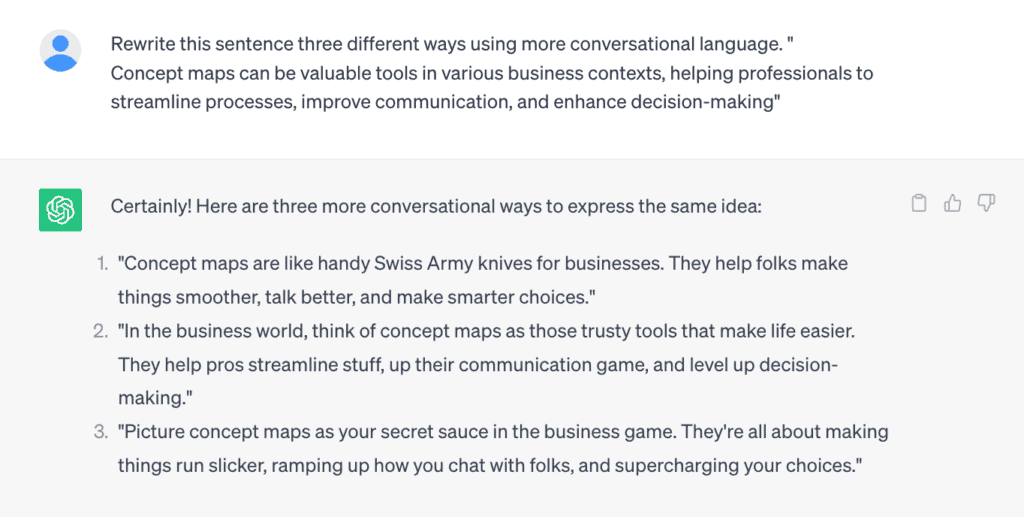
For instance, you can have it brainstorm different ways to rephrase a sentence instead of staring at the wall for 10 minutes trying to find that one word that’s on the tip of your tongue. You can also improve your content suggestions by giving the AI information about your target audience or specifying the writing style you want it to emulate.
In addition to supporting the ideation and editing processes, AI-powered tools like Fireflies are excellent for taking the headache out of transcribing meetings, which is especially useful for content writers who interview experts to give their work a competitive edge.
For research, content writers can leverage paraphrasing tools like Quillbot to create succinct versions of their sources for quicker reference.
While AI tools are great options for streamlining certain content creation steps, AI shouldn’t be used to handle the entire writing process.
"While AI tools are great options for streamlining certain content creation steps, AI shouldn’t be used to handle the entire writing process. "
If you’re concerned about whether a piece of content was computer-generated, there are websites that claim to be able to detect AI writing, but the results are often inconsistent and unreliable. They can help check to see if your content is generic, but we recommend working with content creators who focus on quality over quantity.
At The Blogsmith, we believe in the value of human-crafted content. While we use tools to create more efficient processes, every SEO piece we publish is written and edited by humans.
Link Building
Using AI to help build backlinks is an excellent way to save time and improve your SEO without breaking consumer trust or running into issues about content originality.
Here are a few tasks you can ask an AI tool to help with:
Generating email templates that you can send to get backlinks.
Creating guest post pitches or outlines based on selected keywords.
Brainstorming linkable content ideas based on your target keywords.
Listing influential publications and domains based on keywords or industry so you can target these for backlinks.
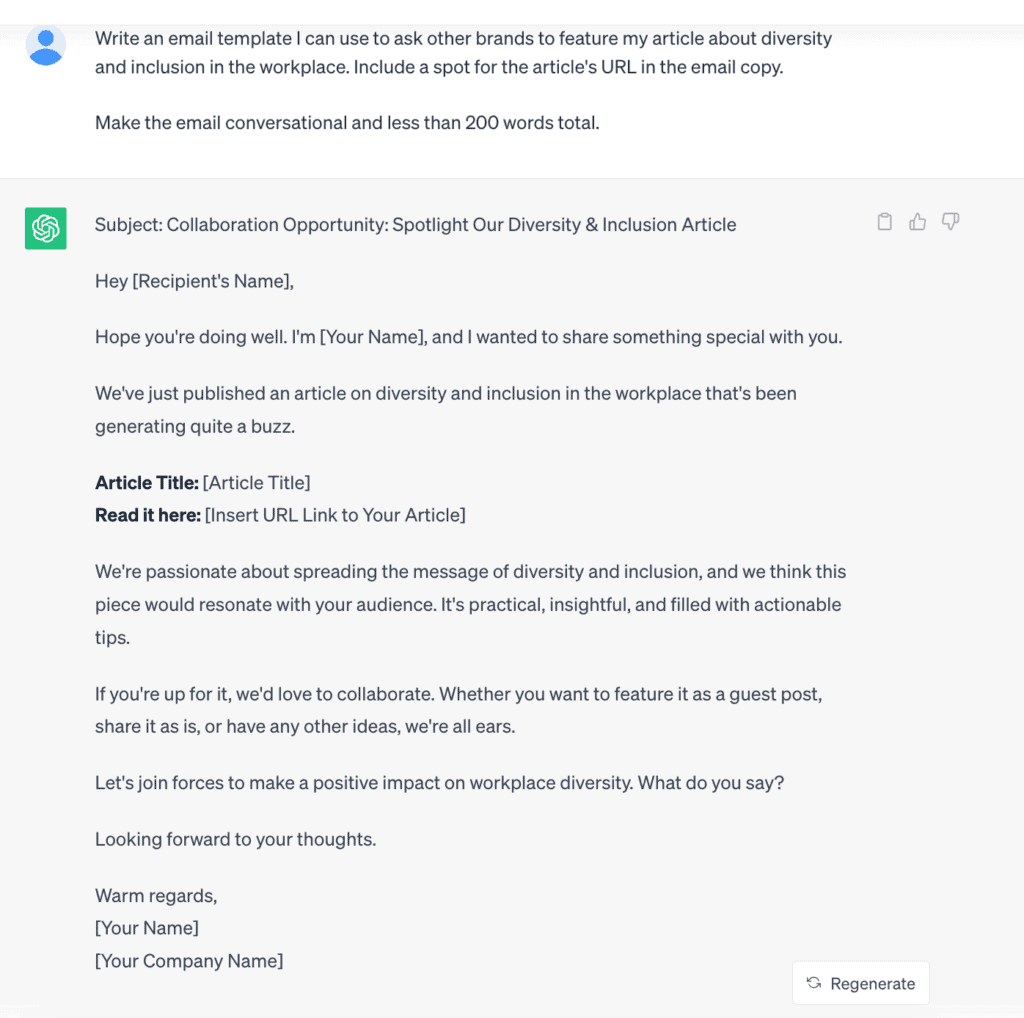
Humans can do all of these tasks, but AI does them faster. You still want to double-check the work, but letting AI handle the first pass at ideation saves valuable time. This, in turn, frees you up to focus more on content strategy.
Why AI-Generated Content Isn’t a Winning SEO Strategy
Using AI to generate entire content pieces in minutes can be tempting. That said, this approach is akin to the spammy keyword-stuffing practices of the olden days of SEO. In other words, using only AI for content saves you time by sacrificing quality, integrity, and consumer trust.
" In other words, using only AI for content saves you time by sacrificing quality, integrity, and consumer trust."
Here’s a look at the implications of using AI-generated content in your SEO marketing strategy and why we stand by the need for human writers.
Google’s Stance on AI-Generated Content
According to Google Search’s guidance on AI-generated content, “Appropriate use of AI or automation is not against our guidelines.” Google isn’t outright banning AI or showing full support. Since the language remains vague, content marketers are left guessing just what Google means as they try to figure out how AI fits into their SEO strategy.
To understand the future of AI and search, let’s take a deeper look at what content qualities Google prioritizes and contrast them with content that may be penalized.
AI Writing vs. Google’s Content Standards
In short, helpful content that takes a people-first approach and follows E-E-A-T best practices can rank highly on Google. In contrast, content that violates spam policies risks banishment from search results.
Overall quality is what Google will use to determine search engine results page (SERP) rankings. But quality is often AI-generated content’s Achilles heel. Not to mention, AI doesn’t have the experience, expertise, or authority that human writers and industry professionals can offer.
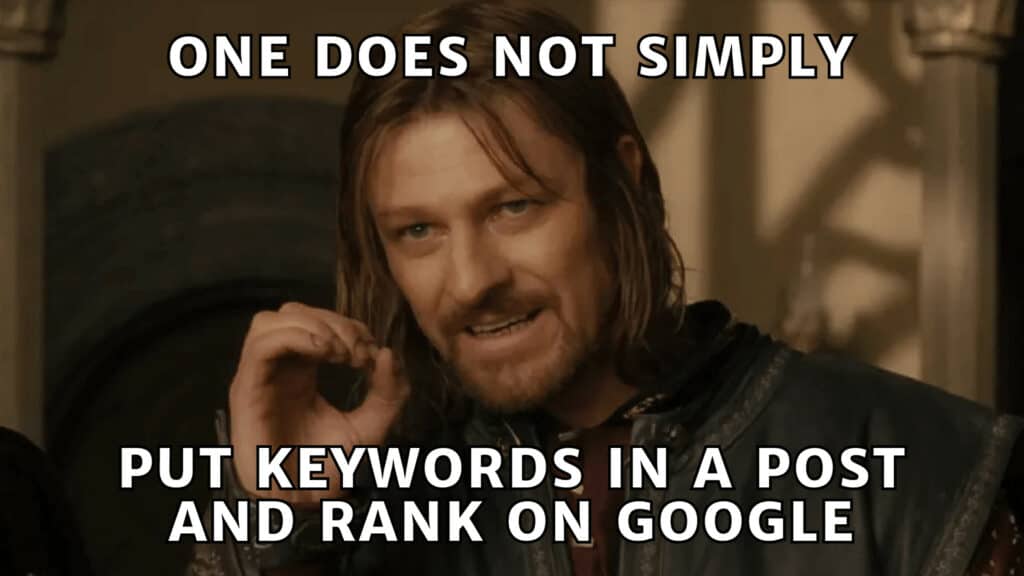
As for trustworthiness, many AI chat tools don’t cite sources, which can lead to instances of confidently reporting misinformation.
Instead of turning to AI chat, or even specialized research tools, in lieu of original research, it’s more effective to leverage AI-powered tools like Fireflies and Quillbot that help you gather and summarize information more efficiently.
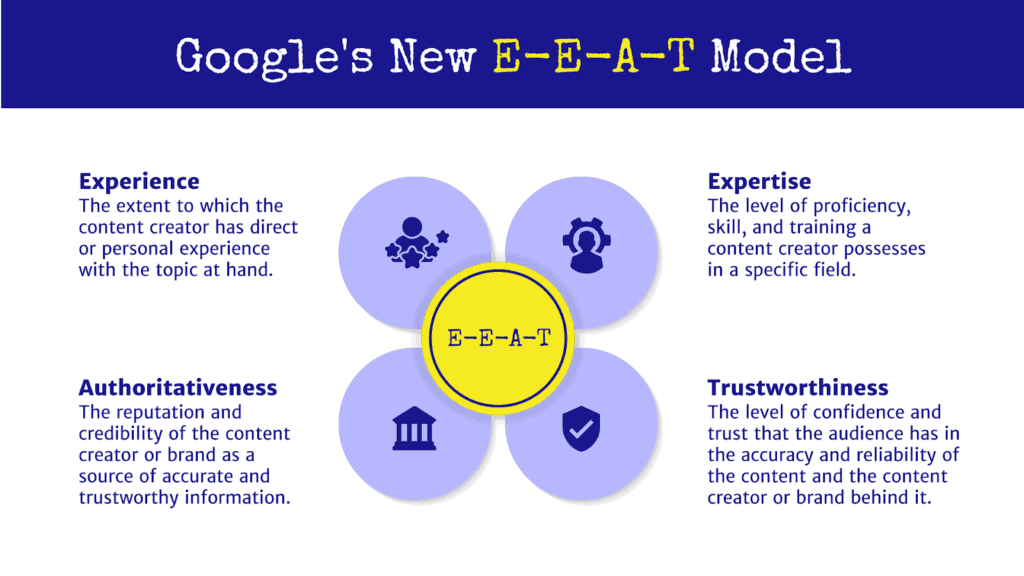
High-quality content has to meet Google’s E-E-A-T guidelines to be more likely to rank, which means the content has:
Experience: The content is based on the author’s first-hand experience.
Expertise: The writer has enough knowledge on the subject or is qualified as an expert on the topic based on their experience, education, or work.
Authority: The writer or the brand has established a positive reputation on the given topic.
Trustworthiness: The piece is factually correct and cites trusted sources when making claims.
With AI-generated text, two potential issues arise when we look at Google’s Spam Policies, which discourage:
- Scraped content: Sites that republish content from other online sources without providing a citation.
- Spammy auto-generated content: Automatically generated text without editing for reader experience.
Ultimately, spammy writing tries to game the system by using automated tools to speed up the writing process and ignoring the user experience.
The Reader Experience
Sure, you want to meet Google’s standards so you can rank higher on SERPs, but it’s the human readers that can turn into customers. So, how does AI content impact your reader’s experience?
At its core, AI doesn’t have the human touch that really connects with your readers. It may be able to work faster, but can it help you build relationships through content or relate personal experiences that aren’t otherwise recorded on the internet for the AI bot to find?
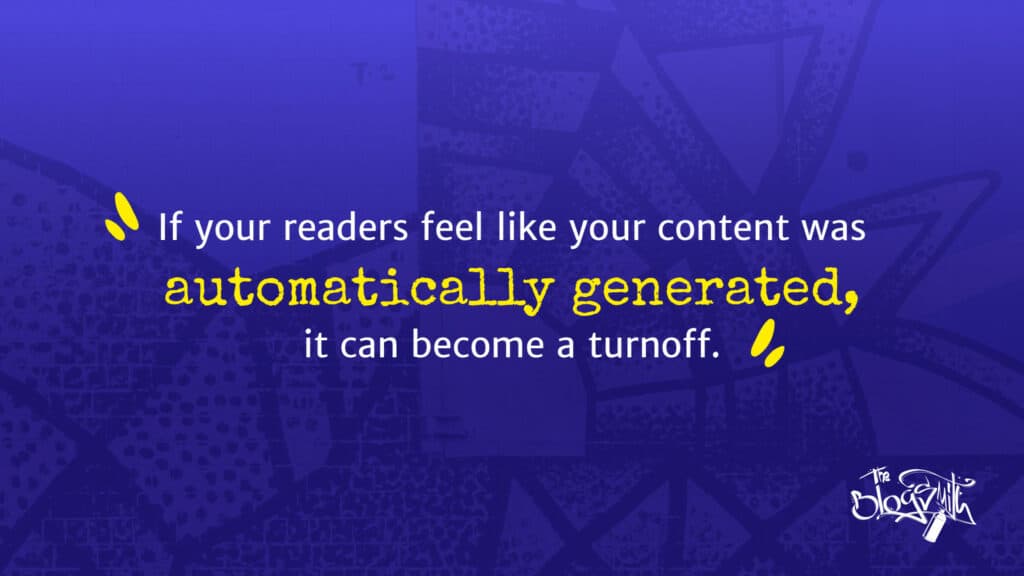
If your readers feel like your content was automatically generated, it can become a turnoff. They’ll likely turn to other brands that do a better job of making them feel seen, heard, and understood.
Plus, AI doesn’t understand your brand and its voice the same way a human writer can. As such, it won’t provide you with content tailored to the voice and tone you’ve worked hard to develop.
Another issue at stake is the uniqueness of content. In Google’s SEO content optimization guidelines, it suggests that brands “create fresh, unique content” and avoid “rehashing (or even copying) existing content.”
Since AI tools are trained on previous data, much of their output is a computerized rehashing of existing writing. Using AI to create whole articles can result in homogenous content that doesn’t create any value for readers and decreases your ability to rank highly on SERPs.
In contrast, when you work with an agency like The Blogsmith, we take the time to learn about your audience, understand your brand’s voice, and match you with writers who have experience with your topic. This enables us to create impactful content for readers at each sales funnel stage.
Content Accuracy
Accuracy is another key ingredient in building trust with Google and your human readers. For now, AI doesn’t have the ability to discern between resources and find the most credible information the same way humans do.
Clickbait half-truths and complete lies look just as real to AI as peer-reviewed research. Plus, many AI content generators don’t cite sources, reducing trustworthiness and making it hard to verify claims.
"Clickbait half-truths and complete lies look just as real to AI as peer-reviewed research."
As a result, AI writing may not be able to provide the most helpful and relevant information to your readers.
This was the case in the Gemini demo when the tool incorrectly stated that the James Webb Space Telescope captured the first images of a planet outside of our own solar system. Without citations, verifying information that an AI chat tool states as fact is difficult.
AI Content and SEO: The Bottom Line
The jury is still out on how AI-generated content will impact SEO content. While it’s not explicitly penalized by search engines, raw AI content isn’t what people want to read. As such, we find it best to continue with tried and true practices for SEO success.
In this video, The Blogsmith Founder Maddy Osman explains the current state of AI writing tools and their role in SEO marketing.
Final Thoughts: How Will AI Affect SEO and Content Marketing?
Even though AI is already affecting SEO, we don’t need to start packing up our desks and making way for an army of briefcase-wielding AI employees.
As content marketers, it’s our job to understand how AI will impact our SEO efforts and the potential implications AI tools have on issues like content quality and originality.
While there’s still much to uncover and learn as we continue experimenting with AI, taking the time to be thoughtful and responsible about implementing content creation tools like ChatGPT, research tools like Clearscope, and automation tools like Fireflies can help us streamline operations while maintaining consumer trust.
To connect with an agency that combines AI and SEO tools with an experienced team of human writers, editors, and research experts, explore The Blogsmith today.

